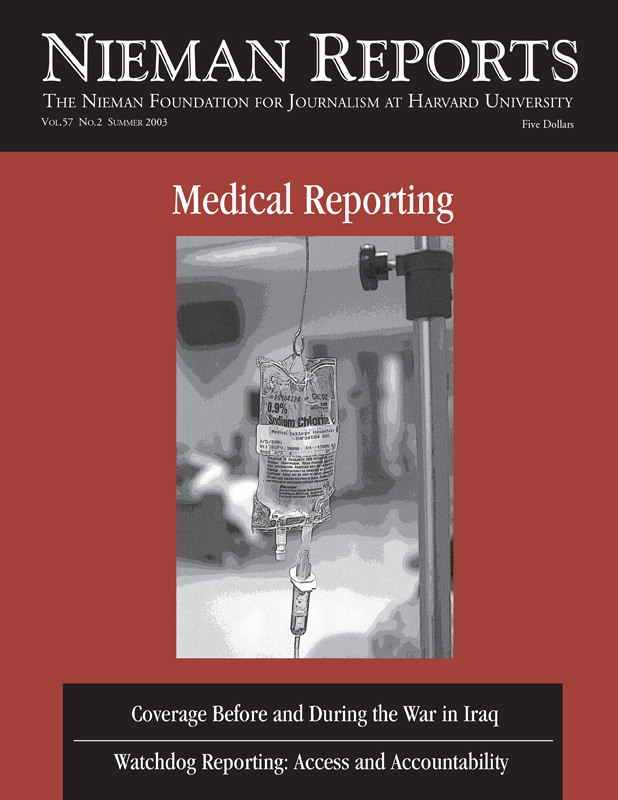June 15, 2003
Share this article

Medical Reporting
“The chasm between medical journalists and physicians appears mostly to be one of ignorance rather than conflicting interests or malice,” writes Terry L. Schraeder, who for 10 years worked as a medical journalist before entering medical school. Now doing her residency in internal medicine, she uses these experiences to highlight the problems between journalists and doctors and ways to close the widening gap of distrust. She is convinced that only when they “understand the other’s professional training, education, deadlines, responsibilities, codes of ethics, and internal stresses” will the chasm narrow. – Melissa Ludtke, Editor
Never use the word “miracle.” Leave that to ministers, mayonnaise-makers and sports-writers.
Don’t use “breakthrough.” Breakthroughs are infrequent and this word, like controversy, is so overused that it has lost much of its impact. And “major breakthrough” is redundant.
Avoid “cure.” Announcements of cures are rare. They must be handled with utmost care. One cure is simple: the cure of hype.
“May” doesn’t mean “will.”
“Suggests” or “indicates” doesn’t mean “finds” or “proves.”
“Contributes to,” “is associated with,” or “is linked to” does not mean “causes.”
If you have time, download the study you’re writing about. Also look for the original news release. See what’s what for yourself.
One study by itself seldom proves anything. Don’t treat the results of a study as the last word.
Identify the source of the story. Attribution precedes assertion. Before telling what was said, tell who said it. If you start like this, “A new study says,” then in the next sentence identify the publication or institution and proceed carefully.
Don’t be an alarmist. Don’t exaggerate. Don’t speculate. Cogitate.
You can’t believe everything you read, but you should believe everything you write.
Medical Reporting
“The chasm between medical journalists and physicians appears mostly to be one of ignorance rather than conflicting interests or malice,” writes Terry L. Schraeder, who for 10 years worked as a medical journalist before entering medical school. Now doing her residency in internal medicine, she uses these experiences to highlight the problems between journalists and doctors and ways to close the widening gap of distrust. She is convinced that only when they “understand the other’s professional training, education, deadlines, responsibilities, codes of ethics, and internal stresses” will the chasm narrow. – Melissa Ludtke, Editor



